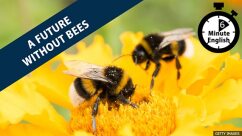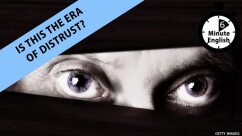Self-cloning_animals.mp3
Self_cloning_animals.pdf
When males are not needed
This is not a word-for-word transcript
Neil
Hello This is 6 Minute English from BBC Learning English I’m Neil
Rob
And I’m Rob Do you think there are big differences between men and women,
Neil? – Apart from the old stereotypes we sometimes hear, like - that men can’t
express emotions…
Neil
I suppose biologically there are differences, Rob I mean, men and women’s
bodies are different
Rob
Right, and it takes both - a man and a woman - to make a baby
Neil
Well, that’s true - in humans anyway But in this programme we’ll be hearing
about creatures in the wild where the classic ‘boy meets girl’ love story doesn’t
apply
Rob
Yes, we’ll be meeting some female animals who don’t need a male to make
babies
Neil
These creatures reproduce by parthenogenesis - also called ‘virgin birth’, this is
the process where the female can reproduce without a mate – the term used for
an animal’s sexual partner
Rob
All animal species survive by making babies – reproducing to make copies of
themselves But amazingly, the female of some species can do it all by herself!
Neil
But before that, it’s time for my quiz question In Britain’s Chester Zoo in 2006,
‘Flora’ laid eleven eggs that developed into healthy babies Her zookeepers were
mystified because Flora had only been kept with other females and had never
been near a male But what type of animal was Flora? Was she:
a) a python?,
b) a zebra shark?, or
c) a Komodo dragon?
Rob
Hmm, pythons are pretty unusual creatures so I’ll say Flora was a python
Neil
OK, Rob, we’ll find out later if you’re right Actually, it’s not only reptiles who
behave this way – the females of many animal species are able to reproduce
without sex
Rob
By doing this they gain several advantages: they can rapidly spread, colonise and
control large areas and they don’t waste time and energy looking for a mate
Neil
But if a world without sex is so much better, why bother with males at all?
Rob
Good question, Neil, and one which BBC World Service programme, Discovery,
asked evolutionary biologist, Chris Wilson:
Chris Wilson
Well absolutely! And there are other advantages I mean, if you’re an all-female
population you don’t have to waste time searching and competing for mates,
there are no more sexually-transmitted diseases and so it seems like the easiest
decision – and yet, less than one percent of all animal species are completely
celibate – and that’s a huge fundamental puzzle in evolutionary biology that
we’re still not entirely sure we understand – it’s called sometimes the paradox of
sex
Neil
Despite the advantages of going without sex, in reality fewer than one percent of
all animals are celibate – live without having sex
Rob
This begs the question, why is sex so common when it seems so inefficient? Chris
calls this the paradox of sex A paradox is a situation which seems contradictory
because it contains two opposite facts, for example, the existence of males if we
can reproduce without them
Neil
As a male myself, I have to say I’m feeling a little underappreciated right now,
Rob!
Rob
Well don’t worry, Neil, because it turns out there might be a use for males after
all! It seems the sex paradox has been solved by one of nature’s most ingenious
insects - aphids
Neil
Here’s ecologist, Amber Wright, explaining how to the BBC World Service’s
Discovery programme
Rob
See if you can hear the strategy American aphids use to reproduce
Amber Wright
The aphids we have in the US – when spring comes around, the eggs hatch and
they’ll be all female for several generations, and then at the end of the summer
they will hatch out males and females and mate, and then create eggs that wait
for next year – kind of the best of both worlds
Presenter Lucy Cooke
Hedging their bets basically – using cloning to rapidly colonise and then using
sex to mix up the genes
Neil
In the spring, female aphids lay eggs which hatch – break open allowing the
young to come out The young aphids that hatch are all female
Rob
But later, at the end of summer, both female and male aphids hatch out and start
to reproduce by mating So the aphids have the best of best of both worlds –
they enjoy the advantages of very different things at the same time
Neil
Or to put it another way, the aphids hedge their bets – they follow two courses
of action instead of choosing between them By cloning themselves with ‘virgin
births’ and reproducing sexually, aphids maximise their chances of survival
Rob
Gardeners around the world will be upset to hear that – those young aphids just
love eating tomato plants!
Neil
But on the plus side, it seems being male can be useful after all
Rob
But not if you’re Flora, the female you asked about in your quiz question So,
what type of animal was she?
Neil
Right – I asked whether the-virgin-Flora was a) a python, b) a shark or c) a
Komodo dragon
Rob
I guessed a) a python
Neil
Well, Rob, you’re right that some female pythons can reproduce by themselves –
and sharks too – but the correct answer is that Flora was, c) a Komodo dragon
OK, let’s recap the vocabulary, starting with mate - an animal’s sexual partner;
something you don’t have if you’re celibate – living without sex
Rob
Animal eggs hatch – or break open to let the young out
Neil
And a paradox is a situation which seems contradictory because it contains two
opposite facts
Rob
Species which reproduce parthenogenetically and sexually have the best of both
worlds - enjoy the advantages of very different things at the same time
Neil
And if you hedge your bets, you follow two courses of action instead of choosing
between them so you don’t miss out
Rob
Well, that’s all there’s time for Bye for now!
Neil
Goodbye!
VOCABULARY
mate
an animal’s sexual partner
celibate
not having sex
paradox
situation which seems contradictory or impossible because it contains two
opposite facts
hatch
when an egg breaks open in order to allow the young animal to come out
the best of both worlds
situation where you can enjoy the advantages of very different things at the
same time
hedge your bets
follow two courses of action instead of making a decision between them in order
to avoid the possibility of losing out









